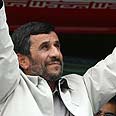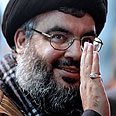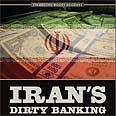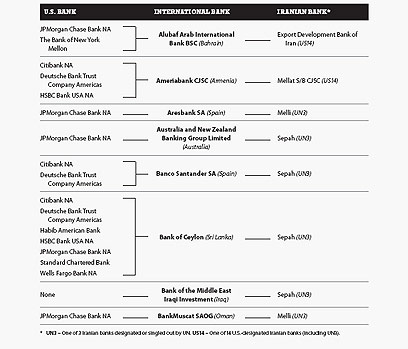



Iranian finances: From Washington, via Tehran, to Gaza
Avi Jorisch, former senior official in US Treasury Department, follows ayatollahs' efforts to obtain foreign currency, discovers that Iranian tentacles spread throughout world, even receive support from large banks in West. Money, as expected, even makes its way to nuclear program
WASHINGTON – While the international sanctions regime prohibits contact with banks in Iran, 18 US banks have indirect financial connections with the Islamic Republic. In this manner, Tehran succeeds in getting its hands on the money needed to finance its nuclear program and to provide aid to terrorist organizations, including Hezbollah and Hamas.
Avi Jorisch, a former US Treasury Department analyst in charge of fighting money laundering for criminal and terrorist purposes, scans in his new book, "Iran's Dirty Banking - How the Islamic Republic Skirts International Financial Sanctions".
In an interview with Ynet, he reveals the extensive financial web spun by Iran in order to obtain dollars, euros, and credit from 59 banks throughout the world.
Jorisch's main claim is that no less than 18 American banks have an indirect relationship with three Iranian banks on the US' black list and another one subjected to UN sanctions. By using various banks around the world as intermediaries, Tehran carries out its finances unhindered, even though three of the prohibited banks funnel money into the nuclear program, the ballistic missile program, and the terrorism network.
Prior to the publication of his book, Jorisch said it's all quite simple – it's all connected to money. He noted that without hard currency, Iran would have a difficult time financing terror networks throughout the world, inciting toward violence, and obtaining nuclear weapons.
Even though the US and the UN have taken measures to isolate Iranian banks, as of today, dozens of banks, including well-known banks in Europe, directly supply Iranian banks with dollars, euros, Japanese yen, and British pounds, claims Jorisch.
What about sanctions?
In 2007, sanctions were imposed by the UN on Iran's Bank Sepah, and a recommendation was issued not to trade with two additional Iranian banks. According to US law, American banks are prohibited from doing business with 14 Iranian banks, which Jorisch researched for his book. However, the law apparently is not tightly enforced.
Bank Sepah is a major player in developing ballistic missiles for the country. Bank Sederat funnels money to Hezbollah, Hamas, Islamic Jihad, and the Popular Front for the Liberation of Palestine. In the five years leading up to the Second Lebanon War, Bank Sederat alone transferred some $50 million to Hezbollah.

Following the money trail. US banks' Iranian connections (chart for Jorisch's book)
Bank Melli is the largest bank in Iran and provides banking services to banks and companies involved in Iran's nuclear and missile programs. Alongside its financial activities, it also transfers more than $100 million to terrorist organizations throughout the world, some of which take direct action against Israel.
Research on Bank Sepah revealed that in the last four years since being black-listed by the international community, the dangerous financial institution has gone about business as usual, unhindered by the West. Bank Sepah has dozens of active branches in Frankfurt, Athens, Paris, Rome, and London, in addition to branches in the Middle East and Asia. Jorisch also learned that Bank Melli and Bank Sederat also have physical operations in these very same cities.
The very existence of these branches is a violation of the UN directives and is in blatant disregard of the sanctions imposed by the US on these three banks.
Not a lost cause
This means that some of the US' closest allies are allowing the Iranian regime free access to the international financial system and hard currency. An even more worrisome implication is that these are not only countries friendly with Iran, but include countries like France and Britain, which support sanctions against Iran and sit as permanent members in the UN Security Council.
In an interview with Ynet last year, Jorisch revealed that Iran makes broad use of the Asian Clearing Union, which was established by the UN in 1974 in order to grant poor states access to dollars. Six months after that interview, Jorisch mapped out ways to put the stops on the ayatollahs' financial activities. The question is why the US is not doing the same.
Could it be that the US administration is turning the other cheek? Jorisch claims no. According to him, Under Secretary for Terrorism and Financial Terrorism in the Treasury Department Stuart Levey has been traveling the world for five years asking banks to cut off ties with Iran. He gave an example in which Levey met with the managers of Deutsche Bank and showed them how they transfer currency to Iran. However, they continue to supply euros and other currencies.
Deutsche Bank is not alone. According to Jorisch, the banks that allow Iran to put its hands on the money needed for its nuclear program and terrorism support are numerous, and include some of the largest financial institutions in the world: J. P. Morgan, Bank of America, CitiBank, Societe Generale, Bank Tokyo Mitsubishi UFJ, and VTB.
Jorisch emphasized that the US administration possesses the means to cripple Iranian financial activities around the world.
The picture painted by Jorisch's book is one in which Iran is evading sanctions through a number of channels around the world. Jorisch said that existing US laws, as well as the legislation being drawn up currently in Congress can put a stop to this worrisome phenomenon.
Jorisch said that this piece of legislation could confront world financial institutions with a decision – either cut off ties with Iran or stop doing business with the US. Forcing them to choose, he said, is the solution.















